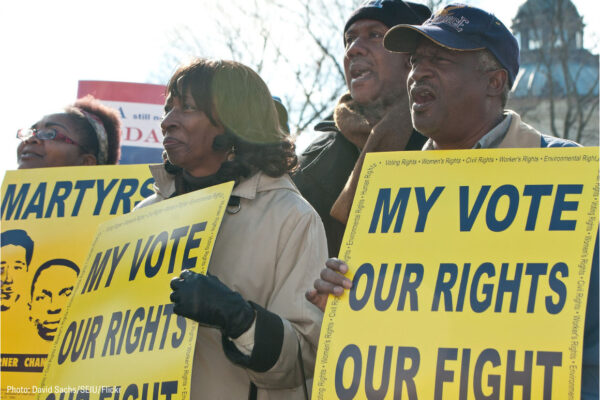For decades, Virginia has been one of the most difficult places in the country for voters to cast their ballots. The election system has included requirements and restrictions deeply rooted in segregation-era policies, many of which were intended to disadvantage Black voters and tied voting rights to the discriminatory trends in our criminal legal system. The combination of tight restrictions and criminal disenfranchisement caused Virginia to be ranked 49th in the nation on voting accessibility as recently as 2018.
Thankfully, the latest session of the Virginia legislature passed a historic slate of election reforms to create a more equitable, modern voting system. These regulations address many of the key obstacles that prevent voters from exercising their democratic freedoms. Several of these reforms will occur in time for the general election this November, with the rest taking effect over the next two years.
By removing obstacles that keep people from voting, we can ensure that those who are most disadvantaged by our government’s current policies have a voice in addressing needed change.
These new policies include:
Expanded Absentee Voting:
- Virginia is doing away with the “excuse requirement” to vote absentee. This allows all registered voters equal opportunity to cast absentee ballots without having to meet one of the pre-approved criteria previously required by the state code.
- Local governments will be able to set up satellite locations to accept absentee votes. The state will allow voters to join a permanent list of people who receive absentee ballots every election, rather than making them reapply each time they vote.
- The deadline for returning an absentee ballot will be expanded so that ballots postmarked on or before the day of the election can be received before noon on the third day after the election.
- First-time voters who are registered to vote by mail and are currently in jail on a misdemeanor charge or awaiting trial will be able to vote by mail, rather than being required to go to a polling place in person.
Less Restrictive ID Requirements:
- Voters will no longer need a photo ID to vote. Those without an ID can instead use a voter registration card, bank statement, utility bill, paycheck, or any government document with their name and address.
Easier Voter Registration:
- Public high schools will be required to provide eligible students time and materials to register to vote, and the DMV will automatically register all eligible voters who do not affirmatively opt out during DMV transactions. Any applicants whose registration is denied for any reason will be informed within five days.
- Starting in 2022, voters will be able to register on Election Day and won’t have to worry about being turned away for not registering in advance.
More Accountable Elections:
- The State Board of Elections will be required to maintain records of every ballot, whether cast by machine or on paper, to make results more reliable and facilitate potential recounts.
Expanded Access to Voting:
- Election Day will be an official state holiday, allowing more Virginians the opportunity to vote and volunteer at the polls.
- Beginning in 2021, polling places will be required to provide ballots and materials in languages other than English.
These new laws represent a massive shift in the ability of Virginians to have their voices count regardless of their individual status or circumstance. By removing obstacles that keep people from voting, we can ensure that those who are most disadvantaged by our government’s current policies have a voice in addressing needed change.
While the legislature has taken significant steps in improving our access to the ballot this year, it is important to understand that these positive changes could all be repealed by the legislature at any time without a constitutional amendment that affirms a right to vote that cannot be revoked or limited by law.
The Virginia constitution does not affirmatively protect the right to vote, and the lack of a constitutional guarantee means a future legislature can take the state right back to the outdated and discriminatory policies of the past. In addition, racial justice at the ballot box can only truly be achieved by repealing the Jim Crow era language in our constitution that permanently deprives anyone convicted of a felony of their vote, unless a governor chooses to give it back. All Virginians 18 and older should have a right to vote that the legislature can’t take away. Our democracy only works when it is responsive to the needs of everyone it serves. Until everyone has both the right and the ability to have their vote count, there will be plenty of work left to do on our election systems.

